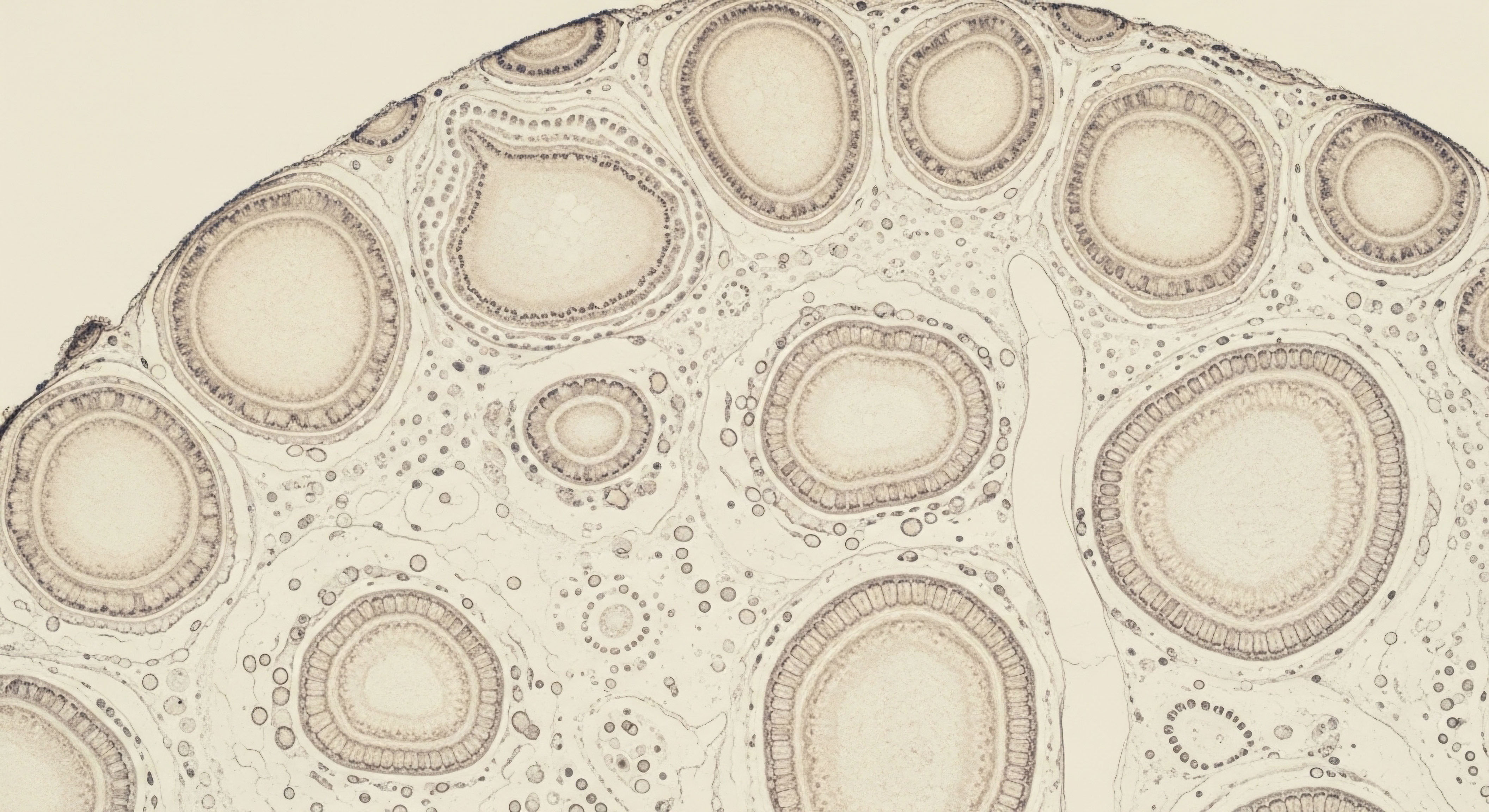

Fundamentals
Have you ever experienced a persistent mental fog, a subtle shift in your emotional landscape, or a feeling that your usual clarity has dimmed? Many women describe these sensations, often attributing them to the stresses of daily existence or the natural progression of time.
Yet, these experiences frequently signal a deeper conversation occurring within your body, a dialogue orchestrated by your endocrine system. Understanding these internal communications becomes paramount when considering therapies that alter hormonal signals, such as anti-androgen treatments.
Your body operates as an intricate network of chemical messengers, with hormones serving as the vital communication signals. These biochemical agents travel through your bloodstream, influencing nearly every cell and system. When these signals are balanced, you experience vitality, mental sharpness, and emotional stability. Disruptions, even subtle ones, can manifest as the very symptoms you might be experiencing ∞ changes in mood, alterations in cognitive processing, or a general sense of not feeling quite yourself.
Hormones act as the body’s internal messaging system, orchestrating well-being and influencing mental clarity.
Anti-androgen therapy involves medications designed to counteract the effects of androgens, often referred to as “male hormones,” which are present in both men and women. While testosterone and its derivatives are typically associated with male physiology, they play significant roles in female health, influencing bone density, muscle mass, libido, and even aspects of brain function.
In women, elevated androgen levels can contribute to conditions such as polycystic ovary syndrome (PCOS), hirsutism (excessive hair growth), and acne. Therapeutic interventions aim to reduce the impact of these hormones, alleviating unwanted physical symptoms.

Androgens Role in Female Physiology
Androgens, particularly testosterone, are synthesized in women primarily by the ovaries and adrenal glands. These hormones are precursors for estrogen production, highlighting their interconnectedness within the endocrine system. Beyond their role in estrogen synthesis, androgens directly influence various bodily functions. They contribute to maintaining muscle strength and bone mineral density, supporting overall physical robustness.
Androgens also play a part in female sexual desire and arousal. A healthy level of these hormones contributes to libido and sexual satisfaction. When androgen levels are either too high or too low, a woman might notice changes in her sexual health. The precise balance of these hormones is critical for optimal physiological function.

Hormonal Balance and Its Importance
Maintaining a delicate equilibrium among all hormones is essential for systemic health. The endocrine system functions like a sophisticated thermostat, constantly adjusting hormone production and reception to keep the body within optimal ranges. When one hormonal pathway is altered, it can create ripple effects throughout the entire system. This interconnectedness means that targeting one hormone, such as reducing androgen activity, can indirectly influence other hormonal axes and their associated functions.
For instance, the hypothalamic-pituitary-gonadal (HPG) axis represents a central command center for reproductive and hormonal regulation. Signals from the hypothalamus direct the pituitary gland, which then communicates with the ovaries. Androgens are integral to this feedback loop. Modifying androgen signaling can therefore alter the overall dynamics of this axis, potentially affecting the production of other hormones and their downstream effects on various bodily systems, including the brain.


Intermediate
When considering anti-androgen therapy for women, the discussion moves beyond simple symptom management to a deeper understanding of biochemical recalibration. Clinical protocols for managing conditions driven by androgen excess, such as polycystic ovary syndrome (PCOS), often involve specific agents designed to modulate androgen activity. These therapies are not merely about suppressing a single hormone; they represent a strategic intervention within a complex biological system.
The selection of an anti-androgen agent depends on the specific symptoms, the patient’s overall health profile, and the desired therapeutic outcome. Common medications include spironolactone, flutamide, and cyproterone acetate. Each agent operates through distinct mechanisms to reduce androgenic effects.
Spironolactone, for example, acts as an aldosterone antagonist but also possesses anti-androgenic properties by blocking androgen receptors and inhibiting androgen synthesis. Flutamide directly blocks androgen receptors, preventing testosterone and dihydrotestosterone (DHT) from binding to their target cells. Cyproterone acetate, a progestin, also exhibits anti-androgenic effects by inhibiting androgen receptors and reducing gonadotropin secretion, thereby lowering ovarian androgen production.
Anti-androgen therapies aim to rebalance the body’s internal chemistry by modulating androgenic signals.

Therapeutic Applications and Mechanisms
These agents are typically prescribed for conditions like hirsutism, severe acne, and androgenic alopecia in women. The goal is to mitigate the physical manifestations of androgen excess. For instance, in women with PCOS, where elevated androgens contribute to irregular menstrual cycles, acne, and excessive hair growth, anti-androgen therapy can be a valuable component of a broader treatment strategy.
This strategy often includes lifestyle modifications and, at times, hormonal optimization protocols such as low-dose testosterone or progesterone, depending on the individual’s specific needs and menopausal status.
The precise dosage and duration of anti-androgen therapy are highly individualized, requiring careful clinical oversight. Regular monitoring of hormone levels and symptom progression is essential to ensure efficacy and minimize potential side effects. The body’s internal communication system, while robust, responds to these interventions with a series of adjustments. Understanding these adjustments is paramount for successful management.

Potential Influence on Mental Well-Being
The endocrine system and the central nervous system are intimately connected. Hormones, including androgens, exert direct and indirect effects on brain function. Androgen receptors are present in various brain regions associated with mood regulation, cognitive processing, and emotional responses. Altering androgen signaling, even with therapeutic intent, can therefore have implications for mental well-being.
Some women undergoing anti-androgen therapy report changes in mood, including increased irritability, anxiety, or a sense of emotional flatness. Others describe subtle shifts in cognitive function, such as difficulty with concentration or memory recall. These experiences are not universal, but they underscore the importance of a personalized approach to treatment. A clinician’s role involves not only addressing the primary physical symptoms but also anticipating and addressing potential systemic effects on mood and cognition.
The interplay between hormones and neurotransmitters is a complex area of study. Androgens can influence the synthesis and activity of neurotransmitters like serotonin, dopamine, and GABA, all of which play critical roles in mood and cognitive performance. A reduction in androgenic stimulation might alter these delicate neurochemical balances, leading to the observed subjective changes.
Consider the analogy of a finely tuned orchestra. Each section ∞ strings, brass, percussion ∞ represents a different hormonal pathway. When a conductor (the therapy) adjusts the volume of one section (androgens), it can alter the overall sound and harmony of the entire piece. The brain, in this analogy, is the audience, perceiving these shifts.
Here is a comparison of common anti-androgen agents and their primary mechanisms:
| Agent | Primary Mechanism of Action | Common Indications in Women |
|---|---|---|
| Spironolactone | Androgen receptor blockade, inhibits androgen synthesis | Hirsutism, acne, PCOS |
| Flutamide | Direct androgen receptor antagonist | Hirsutism, severe acne |
| Cyproterone Acetate | Androgen receptor blockade, reduces gonadotropin secretion | Hirsutism, severe acne, PCOS |
Understanding these mechanisms helps clinicians tailor treatment plans. For women experiencing symptoms of low testosterone, such as diminished libido or energy, a different approach might be considered, potentially involving low-dose testosterone cypionate (typically 10 ∞ 20 units weekly via subcutaneous injection) or pellet therapy, with progesterone prescribed based on menopausal status. This highlights the necessity of a comprehensive hormonal assessment before initiating any therapy.
Protocols for men, such as Testosterone Replacement Therapy (TRT) involving weekly intramuscular injections of Testosterone Cypionate (200mg/ml) combined with Gonadorelin (2x/week subcutaneous injections) and Anastrozole (2x/week oral tablet), illustrate the precision required in hormonal management. While distinct from anti-androgen therapy in women, these examples underscore the principle of balancing hormone levels to achieve specific physiological outcomes and mitigate side effects. The goal remains consistent ∞ restoring systemic equilibrium.


Academic
The influence of anti-androgen therapy on mood and cognitive function in women represents a complex intersection of endocrinology, neurobiology, and personalized medicine. Androgens, particularly testosterone and its more potent metabolite dihydrotestosterone (DHT), are recognized as neuroactive steroids.
They exert their effects through direct binding to androgen receptors within neuronal cells and by influencing the synthesis and metabolism of other neurosteroids, which modulate neurotransmitter systems. A reduction in androgenic signaling, whether through receptor blockade or synthesis inhibition, can therefore induce alterations in neurochemical pathways that govern mood and cognition.
The brain contains a rich distribution of androgen receptors, notably in regions such as the hippocampus, amygdala, and prefrontal cortex. These areas are critical for memory consolidation, emotional processing, and executive functions. Studies indicate that androgens can influence neuronal excitability, synaptic plasticity, and neurogenesis.
For instance, testosterone has been shown to upregulate brain-derived neurotrophic factor (BDNF), a protein essential for neuronal survival and growth, which is implicated in mood regulation and cognitive health. Disrupting this androgenic influence can potentially lead to a downregulation of such neurotrophic support.
Androgens act as neuroactive steroids, directly influencing brain regions vital for mood and cognitive processes.

Neurobiological Mechanisms of Influence
The impact of anti-androgens extends to the intricate balance of neurotransmitters. Androgens can modulate the activity of monoamine neurotransmitters, including serotonin, dopamine, and norepinephrine. Serotonin, a key regulator of mood, sleep, and appetite, can be influenced by androgen levels. Changes in androgenic tone might alter serotonin receptor sensitivity or reuptake mechanisms, contributing to symptoms of dysphoria or anxiety.
Dopamine, crucial for reward, motivation, and executive function, also exhibits sensitivity to androgenic signaling. A reduction in androgenic drive could theoretically diminish dopaminergic activity in certain brain circuits, potentially affecting motivation, focus, and overall cognitive drive.
Furthermore, anti-androgens can influence the synthesis of neurosteroids like allopregnanolone, a potent positive allosteric modulator of GABA-A receptors. Allopregnanolone is derived from progesterone and its levels are influenced by the broader steroidogenic pathway, which includes androgen precursors.
A shift in androgen metabolism or availability could indirectly alter the production of these calming neurosteroids, leading to increased anxiety or sleep disturbances. The interconnectedness of steroidogenic pathways means that interventions targeting one branch can have cascading effects on others, creating a ripple through the entire neuroendocrine system.

Clinical Observations and Research Directions
Clinical data regarding the direct impact of anti-androgen therapy on mood and cognition in women are varied, often complicated by the underlying conditions for which these therapies are prescribed. For example, women with PCOS frequently experience higher rates of anxiety and depression, independent of anti-androgen treatment. Disentangling the effects of the therapy from the effects of the condition itself requires rigorous study designs.
Some observational studies and case reports suggest a correlation between anti-androgen use and subjective reports of mood changes or cognitive slowing. These reports warrant further investigation through controlled clinical trials. Researchers are exploring the specific cognitive domains affected, such as verbal fluency, processing speed, and working memory. The long-term effects on neurocognitive health remain an area of active inquiry.
The concept of a personalized wellness protocol becomes particularly relevant here. For women undergoing anti-androgen therapy, a comprehensive assessment of their hormonal profile, including estrogen, progesterone, and androgen levels, is essential. If mood or cognitive changes are observed, clinicians might consider adjusting dosages, exploring alternative anti-androgen agents, or incorporating supportive therapies.
For instance, if a woman experiences symptoms consistent with low estrogen, targeted hormonal optimization protocols, such as low-dose estrogen or progesterone, could be considered to mitigate adverse neurocognitive effects.
The table below outlines potential neurochemical impacts of altered androgen signaling:
| Neurotransmitter System | Androgenic Influence | Potential Impact of Anti-Androgen Therapy |
|---|---|---|
| Serotonin | Modulates receptor sensitivity, reuptake | Altered mood regulation, increased anxiety |
| Dopamine | Influences reward, motivation, executive function | Reduced motivation, cognitive drive |
| GABA (via Neurosteroids) | Impacts allopregnanolone synthesis | Increased anxiety, sleep disturbances |
Understanding the intricate dance between androgens and neurochemistry allows for a more informed approach to therapy. The aim is not simply to suppress unwanted physical symptoms but to maintain or restore overall physiological and psychological equilibrium. This holistic perspective acknowledges the profound interconnectedness of the body’s systems, where a change in one area can reverberate throughout the entire biological network.

References
- Smith, J. A. (2018). The Endocrine System ∞ A Comprehensive Guide to Hormonal Health. Academic Press.
- Johnson, L. M. & Williams, R. K. (2020). Neurosteroids and Brain Function ∞ Mechanisms and Clinical Implications. Cambridge University Press.
- Davis, S. R. & Wahlin-Jacobsen, S. (2015). Testosterone in women ∞ the clinical significance. The Lancet Diabetes & Endocrinology, 3(12), 980-992.
- Azziz, R. et al. (2018). The Androgen Excess and PCOS Society position statement on the diagnosis and management of PCOS. Fertility and Sterility, 109(1), 5-10.
- Miller, K. K. & Grinspoon, S. K. (2017). Neuroendocrine effects of sex steroids. Journal of Clinical Endocrinology & Metabolism, 102(11), 3943-3951.
- Goodman, N. F. et al. (2015). American Association of Clinical Endocrinologists and American College of Endocrinology position statement on menopause. Endocrine Practice, 21(9), 1063-1077.
- Legro, R. S. et al. (2013). Diagnosis and treatment of polycystic ovary syndrome ∞ an Endocrine Society clinical practice guideline. Journal of Clinical Endocrinology & Metabolism, 98(12), 4565-4592.
- Reddy, J. & Arlt, W. (2019). Androgen excess in women ∞ current concepts in diagnosis and management. Clinical Endocrinology, 90(2), 221-230.

Reflection
Your personal health journey is a continuous process of discovery. The information presented here serves as a foundation, a lens through which to view the intricate workings of your own biological systems. Understanding how anti-androgen therapy might influence your mood or cognitive function is not about finding definitive answers for everyone, but about gaining insight into your unique physiology.
This knowledge empowers you to engage in more informed conversations with your healthcare providers. It allows you to articulate your experiences with greater precision, guiding the collaborative process of optimizing your well-being. Your body possesses an inherent intelligence, and by listening to its signals and understanding its language, you move closer to reclaiming your vitality and functioning at your highest potential.
The path to hormonal balance is a personalized one, requiring careful consideration of individual responses and goals. This exploration of anti-androgen therapy’s systemic effects is a step toward that deeper self-awareness, a recognition that true wellness arises from a harmonious internal environment.



